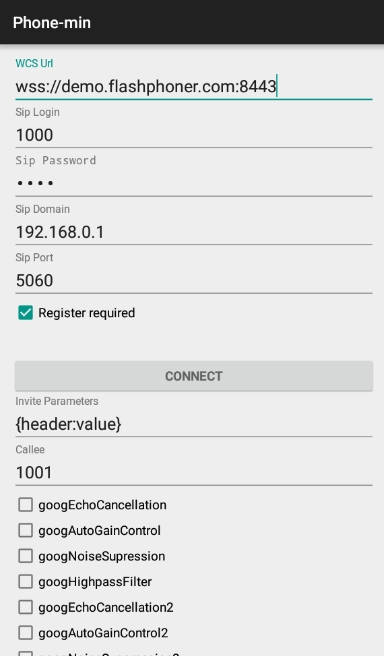Android Phone¶
Example of Android application for audio calls¶
On the screenshot below the example is displayed when a call is established.
In the input field WCS URL, 192.168.2.104 is the address of the WCS server.
In the input field Callee, 001 is the SIP username of the callee.
SIP connection is established/closed when Connect/Disconnect button is clicked.
Call is placed/terminated when Call/Hangup button is clicked, and is put on hold/retrieved when Hold/Unhold button is clicked.

Analyzing the example code¶
To analyze the code, let's take class PhoneMinActivity.java of the phone-min example, which can be downloaded with corresponding build 1.0.1.38.
1. Initialization of the API¶
Flashphoner.init() code
For initialization, Сontext object is passed to the init() method.
2. Session creation¶
Flashphoner.createSession() code
SessionOptions object with URL of WCS server is passed to the method.
SessionOptions sessionOptions = new SessionOptions(mWcsUrlView.getText().toString());
session = Flashphoner.createSession(sessionOptions);
3. Connection to the server¶
Session.connect() code
Connection object with parameters required for establishing SIP connection is passed to the method
Connection connection = new Connection();
connection.setSipLogin(mSipLoginView.getText().toString());
connection.setSipPassword(mSipPasswordView.getText().toString());
connection.setSipDomain(mSipDomainView.getText().toString());
connection.setSipOutboundProxy(mSipDomainView.getText().toString());
connection.setSipPort(Integer.parseInt(mSipPortView.getText().toString()));
connection.setSipRegisterRequired(mSipRegisterRequiredView.isChecked());
session.connect(connection);
4. Receiving the event confirming successful connection¶
Session.onConnected() code
@Override
public void onConnected(final Connection connection) {
runOnUiThread(new Runnable() {
@Override
public void run() {
mConnectButton.setText(R.string.action_disconnect);
mConnectButton.setTag(R.string.action_disconnect);
mConnectButton.setEnabled(true);
if (!mSipRegisterRequiredView.isChecked()) {
mConnectStatus.setText(connection.getStatus());
mCallButton.setEnabled(true);
} else {
mConnectStatus.setText(connection.getStatus() + ". Registering...");
}
}
});
}
5. Call/Hangup button click handler¶
Button.setOnClickListener() code
mCallButton.setOnClickListener(new OnClickListener() {
@Override
public void onClick(View view) {
if (mCallButton.getTag() == null || Integer.valueOf(R.string.action_call).equals(mCallButton.getTag())) {
if ("".equals(mCalleeView.getText().toString())) {
return;
}
ActivityCompat.requestPermissions(PhoneMinActivity.this,
new String[]{Manifest.permission.RECORD_AUDIO},
CALL_REQUEST_CODE);
...
} else {
mCallButton.setEnabled(false);
call.hangup();
call = null;
}
View currentFocus = getCurrentFocus();
if (currentFocus != null) {
InputMethodManager inputManager = (InputMethodManager) getSystemService(Context.INPUT_METHOD_SERVICE);
inputManager.hideSoftInputFromWindow(currentFocus.getWindowToken(), InputMethodManager.HIDE_NOT_ALWAYS);
}
}
});
6. Outgoing call¶
Session.createCall(), Call.call() code
CallOptions object with these parameters is passed to the method:
- SIP username
- audio constraints
- SIP INVITE parameters
case CALL_REQUEST_CODE: {
if (grantResults.length == 0 ||
grantResults[0] != PackageManager.PERMISSION_GRANTED) {
Log.i(TAG, "Permission has been denied by user");
} else {
mCallButton.setEnabled(false);
/**
* Get call options from the callee text field
*/
CallOptions callOptions = new CallOptions(mCalleeView.getText().toString());
AudioConstraints audioConstraints = callOptions.getConstraints().getAudioConstraints();
MediaConstraints mediaConstraints = audioConstraints.getMediaConstraints();
...
try {
Map<String, String> inviteParameters = new Gson().fromJson(mInviteParametersView.getText().toString(),
new TypeToken<Map<String, String>>() {
}.getType());
callOptions.setInviteParameters(inviteParameters);
} catch (Throwable t) {
Log.e(TAG, "Invite Parameters have wrong format of json object");
}
call = session.createCall(callOptions);
call.on(callStatusEvent);
/**
* Make the outgoing call
*/
call.call();
Log.i(TAG, "Permission has been granted by user");
break;
}
}
7. Receiving the event on incoming call¶
Session.onCall() code
@Override
public void onCall(final Call call) {
call.on(callStatusEvent);
/**
* Display UI alert for the new incoming call
*/
runOnUiThread(new Runnable() {
@Override
public void run() {
AlertDialog.Builder builder = new AlertDialog.Builder(PhoneMinActivity.this);
builder.setTitle("Incoming call");
builder.setMessage("Incoming call from '" + call.getCaller() + "'");
builder.setPositiveButton("Answer", new DialogInterface.OnClickListener() {
@Override
public void onClick(DialogInterface dialogInterface, int i) {
PhoneMinActivity.this.call = call;
ActivityCompat.requestPermissions(PhoneMinActivity.this,
new String[]{Manifest.permission.RECORD_AUDIO},
INCOMING_CALL_REQUEST_CODE);
}
});
builder.setNegativeButton("Hangup", new DialogInterface.OnClickListener() {
@Override
public void onClick(DialogInterface dialogInterface, int i) {
call.hangup();
incomingCallAlert = null;
}
});
incomingCallAlert = builder.show();
}
});
}
8. Answering incoming call¶
Call.answer() code
case INCOMING_CALL_REQUEST_CODE: {
if (grantResults.length == 0 ||
grantResults[0] != PackageManager.PERMISSION_GRANTED) {
call.hangup();
incomingCallAlert = null;
Log.i(TAG, "Permission has been denied by user");
} else {
mCallButton.setText(R.string.action_hangup);
mCallButton.setTag(R.string.action_hangup);
mCallButton.setEnabled(true);
mCallStatus.setText(call.getStatus());
call.answer();
incomingCallAlert = null;
Log.i(TAG, "Permission has been granted by user");
}
}
9. Call hold and retrieve¶
Call.hold(), Call.unhold() code
mHoldButton.setOnClickListener(new OnClickListener() {
@Override
public void onClick(View view) {
if (mHoldButton.getTag() == null || Integer.valueOf(R.string.action_hold).equals(mHoldButton.getTag())) {
call.hold();
mHoldButton.setText(R.string.action_unhold);
mHoldButton.setTag(R.string.action_unhold);
} else {
call.unhold();
mHoldButton.setText(R.string.action_hold);
mHoldButton.setTag(R.string.action_hold);
}
}
});
10. DTMF sending¶
Call.sendDTMF() code
mDTMF = (EditText) findViewById(R.id.dtmf);
mDTMFButton = (Button) findViewById(R.id.dtmf_button);
mDTMFButton.setOnClickListener(new OnClickListener() {
@Override
public void onClick(View view) {
if (call != null) {
call.sendDTMF(mDTMF.getText().toString(), Call.DTMFType.RFC2833);
}
}
});
11. Outgoing call hangup¶
Call.hangup() code
12. Incoming call hangup¶
Call.hangup() code
builder.setNegativeButton("Hangup", new DialogInterface.OnClickListener() {
@Override
public void onClick(DialogInterface dialogInterface, int i) {
call.hangup();
incomingCallAlert = null;
}
});
13. Disconnection¶
Session.disconnect() code